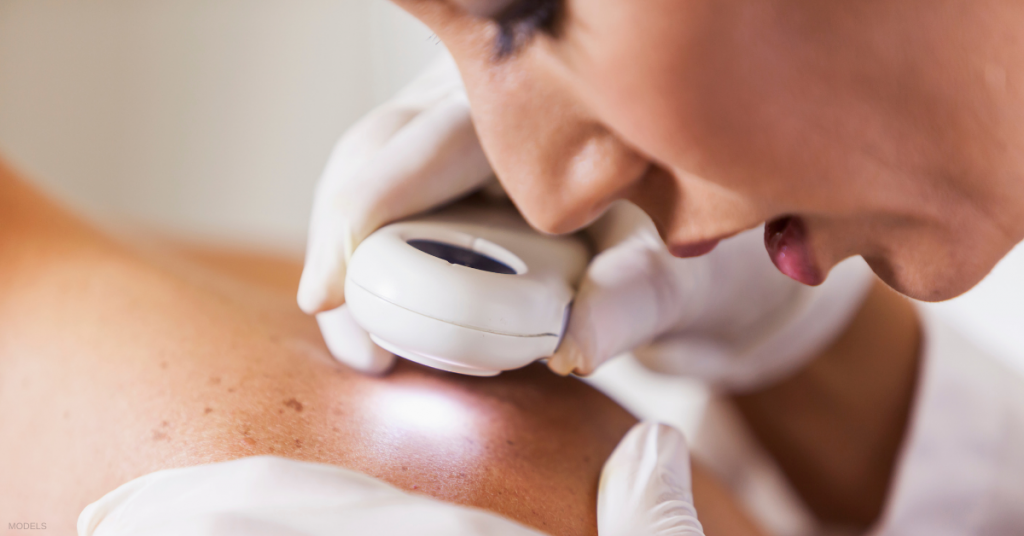Each year, more than 1.2 million Americans are diagnosed with skin cancer. While this diagnosis isn’t usually immediately life-threatening, it does require corrective treatment to prevent it from spreading further. Mohs surgery is one of the most effective, trusted ways to remove these cancerous skin cells directly.
You may find yourself with a few questions—both big and small—when your doctor first mentions this treatment option. Here are a few answers to some of the most common topics we hear from Mohs surgery patients at our Houston dermatology practices.
What is Mohs surgery? How is it performed?
Mohs surgery is a specialized skin cancer treatment that involves removing the cancerous cells and a very thin layer of skin tissue. The layer of skin is then immediately frozen and microscopically examined in a laboratory setting for cancer cells. If cancer cells are found, an additional thin layer of tissue is taken from the area. The process continues, layer by layer, until every trace of cancer is removed.
During Mohs surgery, only the affected skin is removed, preserving as much of the surrounding healthy tissue as possible. The procedure is performed under local anesthetic as an outpatient procedure.
Do you get stitches after Mohs surgery?
The wound during Mohs surgery can be reconstructed in different ways, such as with stitches, skin flaps, or skin grafts. Sometimes, depending on the wound’s size and location, your doctor may suggest letting the skin heal naturally. In most cases, your surgeon will repair the affected area the same day as your surgery. In rare instances, your Mohs surgeon may refer you to other specialists for the repair as they feel is necessary.
No matter the choice, always follow your surgeon’s post-op wound care instructions to help with healing and minimize scarring.
Can I drive home after Mohs surgery?
In most cases, you should be able to drive yourself home after undergoing Mohs surgery. During the procedure, the treatment area will be numbed with lidocaine. You remain completely awake throughout your visit, and no recovery from anesthesia is required.
How long does it take for Mohs surgery to heal?
Your surgical scar will heal after around 1 to 2 weeks. During this time, plan on wearing a dressing and avoiding any strenuous activities. The area may feel slightly swollen or even lumpy, especially during the first few months. These side effects are common and will fade as your body continues to recover.
Does insurance cover Mohs surgery?
Mohs surgery is covered by most insurance plans, including medicare. As a courtesy, we will be happy to verify your insurance benefits and file an insurance claim on your behalf. We may not be contracted with all insurance companies, but out-of-network benefits can apply.
What is a fellowship-trained Mohs surgeon?
Fellowship-trained Mohs surgeons are physicians (usually dermatologists) who embark on an intensive training program approved by the American College of Mohs Surgery. During the 1- to 2-year fellowship, these surgeons perform at least 500 Mohs procedures and gain hands-on education in rare tumor pathology, reconstructing complex wounds, and other related issues.
At DermSurgery, our fellowship-trained Mohs surgeons include Dr. Leonard Goldberg (honored with a Career Achievement award from the American College of Mohs Surgery), Dr. Arash Kimyai-Asadi, Dr. Lucile White, Dr. Anna Drosou, Dr. Sonal Parikh, and Dr. Nhan Nguyen.
Take the Next Step
When it comes to a procedure as important as Mohs surgery, you deserve nothing but the best care. Our board-certified, fellowship-trained Mohs surgeons are eager to help you enjoy healthy, cancer-free skin. Remember that early detection through annual skin cancer checks is key but preventing damage through consistent sun protection is equally as important.
If you would like to learn more about Mohs surgery at our dermatology practices here in Houston, please request a consultation online. You can also contact our practice by phone at (713) 791-9966.


Leave a Reply